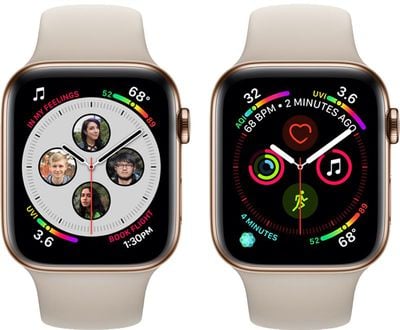Apple has partnered with pharmaceutical company Eli Lilly and health startup Evidation to determine whether data collected from the iPhone and Apple Watch can be used to detect early signs of dementia.
A research paper published this week and shared by CNBC lists researchers from Eli Lilly, Apple, and Evidation Health. The paper, called "Developing Measures of Cognitive Impairment in the Real World from Consumer-Grade Multimodal Sensor Streams," explores whether sensor data and activity info from smart watch devices can be mined for "physiological and behavior signatures of cognitive impairment."

The ubiquity and remarkable technological progress of wearable consumer devices and mobile-computing platforms (smart phone, smart watch, tablet), along with the multitude of sensor modalities available, have enabled continuous monitoring of patients and their daily activities. Such rich, longitudinal information can be mined for physiological and behavioral signatures of cognitive impairment and provide new avenues for detecting MCI in a timely and cost-effective manner.
In this work, we present a platform for remote and unobtrusive monitoring of symptoms related to cognitive impairment using several consumer-grade smart devices. We demonstrate how the platform has been used to collect a total of 16TB of data during the Lilly Exploratory Digital Assessment Study, a 12-week feasibility study which monitored 31 people with cognitive impairment and 82 without cognitive impairment in free living conditions. We describe how careful data unification, time-alignment, and imputation techniques can handle missing data rates inherent in real-world settings and ultimately show utility of these disparate data in differentiating symptomatics from healthy controls based on features computed purely from device data.
According to the abstract, 31 people with cognitive impairment and 82 without cognitive impairment were monitored over a 12-week period, with 16TB of data collected. The study claims that the data was able to be used to differentiate people with early signs of cognitive impairment from those who were healthy.
People who had symptoms of cognitive decline typed more slowly, typed less regularly, relied more heavily on support apps, and sent fewer text messages. The study did not reach long-term conclusions as more analysis is needed.
In a statement to CNBC, Evidation co-founder Christine Lemke said that data collected from the iPhone, Apple Watch, and Beddit sleep monitors was used for the study. Apple acquired the company behind the Beddit sleep monitor back in 2017.
"With this research, we looked at how everyday behavior data, such as those captured by iPhones, Apple Watches, and Beddit sleep monitors, may be effective in differentiating between individuals with mild cognitive impairment and early Alzheimer's disease, and those without symptoms."
Early detection of dementia is important because an early diagnosis can allow for better management of symptoms and quality of life improvements even though the progression of the disease can't be stopped. According to the World Health Organization, 50 million people around the world have dementia, with close to 10 million new cases surfacing every year.






















